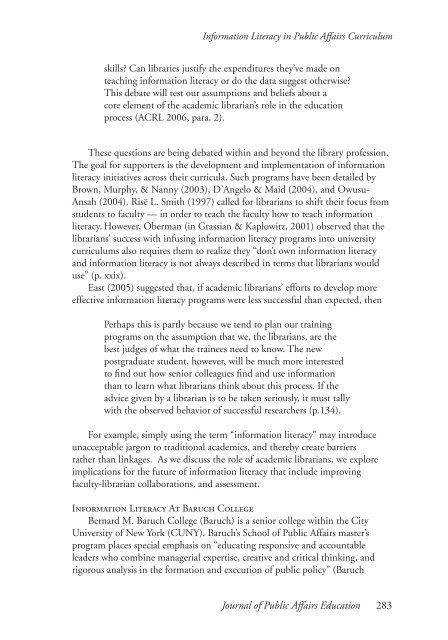JOURNAL OF PUBLIC AFFAIRS EDUCATION - Naspaa
JOURNAL OF PUBLIC AFFAIRS EDUCATION - Naspaa
JOURNAL OF PUBLIC AFFAIRS EDUCATION - Naspaa
You also want an ePaper? Increase the reach of your titles
YUMPU automatically turns print PDFs into web optimized ePapers that Google loves.
Information Literacy in Public Affairs Curriculumskills? Can libraries justify the expenditures they’ve made onteaching information literacy or do the data suggest otherwise?This debate will test our assumptions and beliefs about acore element of the academic librarian’s role in the educationprocess (ACRL 2006, para. 2).These questions are being debated within and beyond the library profession.The goal for supporters is the development and implementation of informationliteracy initiatives across their curricula. Such programs have been detailed byBrown, Murphy, & Nanny (2003), D’Angelo & Maid (2004), and Owusu-Ansah (2004). Risë L. Smith (1997) called for librarians to shift their focus fromstudents to faculty — in order to teach the faculty how to teach informationliteracy. However, Oberman (in Grassian & Kaplowitz, 2001) observed that thelibrarians’ success with infusing information literacy programs into universitycurriculums also requires them to realize they “don’t own information literacyand information literacy is not always described in terms that librarians woulduse” (p. xxix).East (2005) suggested that, if academic librarians’ efforts to develop moreeffective information literacy programs were less successful than expected, thenPerhaps this is partly because we tend to plan our trainingprograms on the assumption that we, the librarians, are thebest judges of what the trainees need to know. The newpostgraduate student, however, will be much more interestedto find out how senior colleagues find and use informationthan to learn what librarians think about this process. If theadvice given by a librarian is to be taken seriously, it must tallywith the observed behavior of successful researchers (p.134).For example, simply using the term “information literacy” may introduceunacceptable jargon to traditional academics, and thereby create barriersrather than linkages. As we discuss the role of academic librarians, we exploreimplications for the future of information literacy that include improvingfaculty-librarian collaborations, and assessment.Information Literacy At Baruch CollegeBernard M. Baruch College (Baruch) is a senior college within the CityUniversity of New York (CUNY). Baruch’s School of Public Affairs master’sprogram places special emphasis on “educating responsive and accountableleaders who combine managerial expertise, creative and critical thinking, andrigorous analysis in the formation and execution of public policy” (BaruchJournal of Public Affairs Education 283
















